Does thinking globally require unpleasant action locally ?
Posted by Big Gav in aluminium, iceland, nimbyism
The Economist has an interesting article on the tradeoffs between local and global action on the environment, using renewable energy powered aluminium smelters in Iceland as an example - Testing metal. Whether or not we could do without making more aluminium is a question left unexamined (though I'd suggest if we recycled all of it, at some point we wouldn't need to make any more).
There are currently three aluminium smelters in Iceland, with a fourth under construction and others planned. Iceland is one of the world’s top ten producers, despite having no bauxite (the main ingredient) and a population of barely 300,000. Aluminium has a huge share in the economy, accounting for 37% of exports in the early part of this year, compared with just 10% in 1995.
This investment boom is driven by one thing alone: cheap, clean power. Aluminium smelting is a very power-hungry business. Indeed, electricity accounts for such a high proportion of costs that it is worthwhile shipping the raw materials to a spot with cheap power, such as Iceland, and shipping the finished aluminium on again to consumers elsewhere.
Iceland has lots of rivers, and sits atop a volcanic ridge. Its electricity comes almost entirely from hydropower and geothermal plants. There are plenty of rivers left to dam, and lots of subterranean steam to tap. Local power companies have even started building power plants solely to cater to new smelters. Electricity consumption has more than doubled in recent years; Iceland now uses more power per person than any other country in the world. And consumption will only grow as more smelters are built.
But some Icelanders are beginning to have doubts. A planned expansion of the oldest smelter, near Reykjavik, was defeated in a local referendum last year. Saving Iceland wants to call a halt to all such projects. But the prime minister, Geir Haarde, argues that the protesters do not reflect the views of most Icelanders, especially in the smaller and more remote communities in the north and east of the country, who welcome smelters and the jobs they bring.
Others believe that Iceland has a moral obligation to use its plentiful clean energy for the benefit of the planet. If the aluminium is not made in Iceland, the theory runs, it will be made somewhere else, using much grubbier energy. Smelting has grown rapidly in China in recent years, for example, fuelled by coal-fired power. Were it not for Iceland, China would presumably be making even more aluminium. Iceland, in other words, should sacrifice its own landscape for the good of the planet.
Saving Iceland denounces that formula as a false dichotomy. If everyone lived more modest lives, it says, we would not need so much aluminium in the first place. But that sounds like wishful thinking. It might not be too much of a sacrifice for extravagant Westerners to drink fewer fizzy drinks from aluminium cans, and to take fewer flights in aluminium planes. But it is hard to believe that consumption of aluminium will fall any time soon, given the growing demand from developing countries.
What is more, even if more aluminium is not really needed, there are plenty of other good uses to which Iceland could put its green power. There is already talk of locating data centres there. What could be worthier than helping to keep the internet running? And if electricity is going to be made anywhere, it might as well be made where it does the least damage to the environment.
On the other hand, the damage to the environment from a new dam must seem enormous if you happen to live at the bottom of the valley being flooded. Not many people live anywhere in Iceland, it is true. But the few that do probably value the preservation of their immediate surroundings more than an intangible and, in the grand scheme of things, tiny contribution to the health of the atmosphere.
“Think globally, act locally” is a classic environmentalist’s rallying cry. But what should the green at heart do when the two are at odds?






